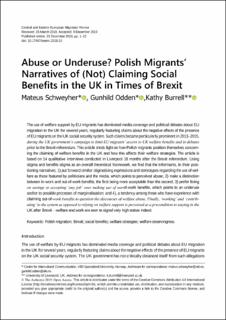| dc.contributor.author | Schweyher, Mateus | |
| dc.contributor.author | Odden, Gunhild | |
| dc.contributor.author | Burrell, Kathy | |
| dc.date.accessioned | 2020-03-30T09:07:30Z | |
| dc.date.available | 2020-03-30T09:07:30Z | |
| dc.date.created | 2020-01-05T20:45:57Z | |
| dc.date.issued | 2019 | |
| dc.identifier.citation | Central and Eastern European Migration Review. 2019, 8 (2), 1-22. | en_US |
| dc.identifier.issn | 2300-1682 | |
| dc.identifier.uri | https://hdl.handle.net/11250/2649321 | |
| dc.description | Funding: The article has been written within the framework of the project Doing Familiy Across Borders. A Comparative Study of Work, Family and Welfare Strategies among Polish Migrants in Norway, Sweden and the UK, funded by the Research Council of Norway (2016–2019). | en_US |
| dc.description.abstract | The use of welfare support by EU migrants has dominated media coverage and political debates about EU migration in the UK for several years, regularly featuring claims about the negative effects of the presence of EU migrants on the UK social security system. Such claims became particularly prominent in 2013–2015, during the UK government’s campaign to limit EU migrants’ access to UK welfare benefits and in debates prior to the Brexit referendum. This article sheds light on how Polish migrants position themselves concerning the claiming of welfare benefits in the UK and how this affects their welfare strategies. The article is based on 14 qualitative interviews conducted in Liverpool 18 months after the Brexit referendum. Using stigma and benefits stigma as an overall theoretical framework, we find that the informants, in their positioning narratives, 1) put forward similar stigmatising expressions and stereotypes regarding the use of welfare as those featured by politicians and the media, which points to perceived abuse; 2) make a distinction between in-work and out-of-work benefits, the first being more acceptable than the second; 3) prefer living on savings or accepting ‘any job’ over making use of out-of-work benefits, which points to an underuse and/or to possible processes of marginalisation; and 4), a tendency among those who have experience with claiming out-of-work benefits to question the discourses of welfare abuse. Finally, ‘working’ and ‘contributing’ to the system as opposed to relying on welfare support is perceived as a precondition to staying in the UK after Brexit – welfare and work are seen to signal very high stakes indeed. | en_US |
| dc.description.sponsorship | | |
| dc.language.iso | eng | en_US |
| dc.publisher | Centre of Migration Research, University of Warsaw, and Polish Academy of Sciences | en_US |
| dc.subject | polish migration | en_US |
| dc.subject | polsk migrasjon | en_US |
| dc.subject | Brexit | en_US |
| dc.subject | social benefits | en_US |
| dc.subject | sosiale fordeler | en_US |
| dc.subject | welfare strategies | en_US |
| dc.subject | velferdsstrategier | en_US |
| dc.subject | welfare deservingness | en_US |
| dc.title | Abuse or underuse? Polish migrants' narratives of (not) claiming social benefits in the UK in times of Brexit | en_US |
| dc.type | Peer reviewed | en_US |
| dc.type | Journal article | en_US |
| dc.description.version | publishedVersion | en_US |
| dc.rights.holder | Open Access | en_US |
| dc.source.pagenumber | 1-22 | en_US |
| dc.source.volume | 8 | en_US |
| dc.source.journal | Central and Eastern European Migration Review | en_US |
| dc.source.issue | 2 | en_US |
| dc.identifier.doi | 10.17467/ceemr.2019.10 | |
| dc.identifier.cristin | 1766408 | |
| cristin.unitcode | 251,4,1,0 | |
| cristin.unitcode | 251,4,3,0 | |
| cristin.unitname | Senter for diakoni og profesjonell praksis | |
| cristin.unitname | Senter for interkulturell kommunikasjon | |
| cristin.ispublished | true | |
| cristin.fulltext | original | |
| cristin.qualitycode | 1 | |
